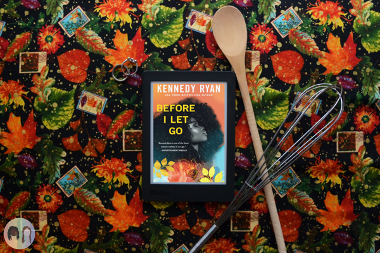

“I’ve fallen in love with the warrior woman who walked through fire, the one who came through stronger, reshaped by sorrow, reformed by grief, reborn in joy.”
Yasmen & Josiah fell in love and got married young, had two children, and built a successful local restaurant from the ground up. But after a series of devastating experiences that neither of them could control, their combined trauma and inability to cope led to their relationship falling apart, ending in a divorce. Before I Let Go takes place after a couple years of co-parenting, business running, and trying to pull themselves out of their personal slumps, and we primarily follow Yasmen—although there are chapters in Josiah’s perspective as well—as she navigates her recovery from a deep depression. As Yasmen begins to heal, her more-or-less platonic dynamic with Josiah begins to shift, but they both have a long way to go before they can trust each other and move forward. With Yasmen finally experiencing joy again despite her strained relationship with her daughter, and Josiah being forced to confront the feelings he’s been shoving aside for years upon realizing his son was struggling more than they had realized, Before I Let Go is an exploration of painful healing after profound trauma culminating in a second-chance romance the likes of which I have never encountered before. The themes of this novel were emotionally impactful, such that anyone who has experienced a form of trauma would likely feel seen and validated on an intimate level.
This is the second book by Kennedy Ryan that I’ve picked up, and its tone is a far cry from what I’ve perceived to be her usual approach—a mix between fluffy romance and heavier topics culminating into a whole lot of steamy dynamics. Before I Let Go is a romance novel, yes, but at its core, it’s a profoundly impactful, explorative deep-dive into mental health, grieving, the push and pull of familial relationships, and the process of picking oneself up and putting oneself back together after tremendous hardship and personal loss. While this may sound like a bit of a downer—and perhaps make you wonder why I recommend it in the new year—it is as inspiring and thought-provoking as it is emotionally vulnerable and heart-wrenching. In fact, considering the length of the novel, the depth to which these issues were addressed, and the slow-burn of the second-chance romance that’s pivotal to the story, I would hesitate to fully describe this novel as a romance novel and a romance novel only. I find the categorization of books as “romances” presupposes a fluffy-ness that this book simply doesn’t have. It’s raw and emotional and, simply put, Kennedy Ryan pulls no punches. The impact on the reader is a gut-punch, and that’s considering the fact that I, as a reader, have no personal experience with the traumatic events recounted in this book. For that reason, if you identify as a woman or nonbinary person with children or who has struggled with having children, I’d strongly suggest you check out the content warnings in this review before picking up the book itself. I won’t say what exactly occurred as doing so would verge on spoiler territory—and admittedly, I have a bone to pick with how the publisher chose to market this book, where the summary alludes to a romance that is much lighter than this book turned out to be. Nevertheless, the dynamic between our two main characters is angsty and characterized by an intense passion that is evident from the start of the book, making the slow-burn reconciliation and the process of falling back into each other equal parts excruciating and fascinating. The inevitably of the Happily-Ever-After (and there is an HEA) didn’t change the fact that it was a hard-fought happy ending following a long and arduous journey of healing and forgiveness.
“Divorce may or may not be. Broken relationships may or may not be. You may never repair those completely but you’re still here to try. Do you recognize what an amazing gift that is? To still be here to try?”
The themes were heavy and dark, as I said, so I encourage the utmost care and compassion to oneself before picking up this book. The author does a formidable job handling the sensitive topics carefully, but the heaviness should not be undersold. That being said, as a person who has gone through my own trauma—although the events that I lived through are completely different from the ones described in this book—I found the author’s exploration of grief, depression, self-care, and recovery to be equal parts difficult and inspiring. The process of putting yourself back together after trauma is a slow, painful, and burdensome one, but it is also beautiful and indicative of human resilience, and this book depicts that well. The relationships external to the romantic dynamic, such as the therapeutic relationship, familial bonds, and friendship, were also front and center throughout this whirlwind of a story. I am hugely obsessed with the “found family” trope, more so than I am romance itself (which is hilarious considering the amount of romance I read), so these dynamics are often my favourite parts of books, and Kennedy Ryan certainly did a phenomenal job in rounding out this story with strong, fully-developed supporting characters with beautiful, wholesome relationships. Suffice it to say, I was very much invested in the story from beginning to end, and I would totally recommend it to someone who is looking for a Happily-Ever-After that is emotionally intense, honest in its vulnerability, and altogether rewarding.
Content warnings (spoilers!): loss of a child; descriptions of grief and depression; divorce; suicidal ideation; stillborn birth (lead-up to which occurs on-page, but in the past); loss of a full-term pregnancy; discussion of high-risk pregnancy, vasectomy, tubal ligation; strained parent-child relationship; off-page death of a loved one; messy divorce following traumatic experience.

